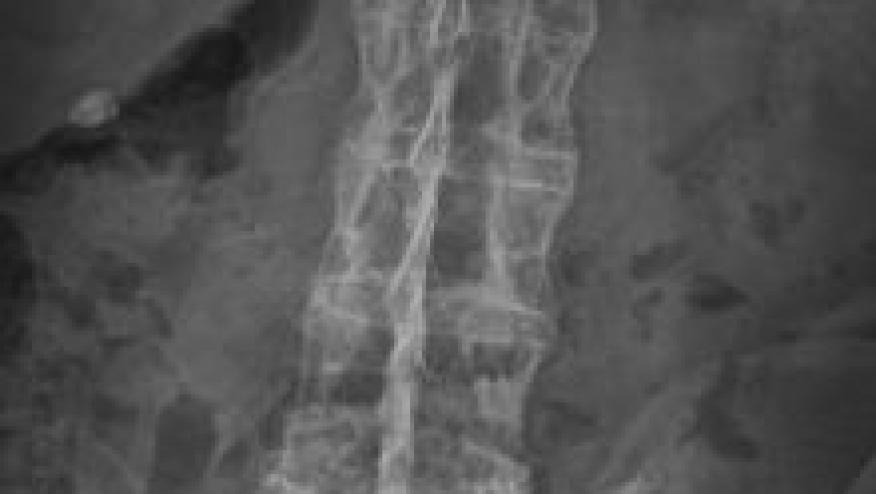MEASURE 3 Study - Anti-IL17 Benefits Persist in Spine Disease Save

Patients with ankylosing spondylitis (AS) have shown rapid and sustained responses to secukinumab (Cosentyx) in a third phase III trial that includes a higher dose of this anti-interleukin-17A monoclonal antibody, researchers reported.
At week 16 (the end of the placebo-controlled part of the trial known as MEASURE 3), 20% improvements on the criteria of the Assessment of Spondyloarthritis International Society (ASAS) were seen in 60.5% of patients receiving 300 mg of subcutaneous secukinumab every 4 weeks and in 58.1% of those given 150 mg every 4 weeks, compared with 36.8% of those given placebo (P<0.01 for 300 mg, P<0.05 for 150 mg versus placebo), according to Karel Pavelka, MD, of Charles University in Prague, and colleagues.
And at the week 52 time point of the ongoing 3-year study, ASAS20 responses were seen in 68.4% and 58.1% of the 300-mg and 150-mg groups, they reported online in Arthritis Research & Therapy.
In both MEASURE 1 and MEASURE 2, 61% of patients receiving 150 mg secukinumab every 4 weeks had ASAS20 responses at week 16. In addition, in MEASURE 1, 60% of those given 75 mg every 4 weeks had ASAS20 responses, while in MEASURE 2, 41% of those in the 75 mg group had ASAS20 responses. In the placebo group, ASAS20 responses were seen for 29% and 28% in the two trials, respectively.
MEASURE 3 is the first phase III study to evaluate the higher 300 mg dose, following a 10 mg/kg intravenous loading regimen, and is being conducted at more than 50 centers in Europe and the Americas.
The trial enrolled 226 patients with moderate to severe AS. Previous treatment with disease-modifying anti-rheumatic drugs (DMARDs) and tumor necrosis factor (TNF) inhibitors was permitted, and concomitant treatment with nonsteroidal anti-inflammatory drugs, DMARDs, and prednisone was allowed.
Patients' mean age was 42.5 and mean disease duration was almost 6 years. Almost two-thirds were men, and one-quarter had previously been treated with a TNF inhibitor.
Significant differences between the active treatment and placebo were already seen by week 1, the researchers noted.
On the secondary endpoint of ASAS40 responses at week 16, significant differences were seen for both the 300-mg and 150-mg groups, at 42.1% and 40.5%, compared with placebo, at 21.1% (P<0.05 for both).
The ASAS5/6 response criteria (at least a 20% improvement in five of six ASAS domains) were met at week 16 by 39.5% of the 300-mg group and by 41.9% of the 150-mg group, compared with 14.5% of the placebo group (P<0.05 for both), while ASAS partial remission at week 16 was significantly greater than placebo only for the 300-mg group (21.1% vs 1.3%, P<0.05).
Among the 199 patients who completed 52 weeks of treatment, ASAS40 responses were seen in 53.9% and 40.5% of the 300-mg and 150-mg groups, respectively. At that time point, improvements in all endpoints were seen among patients initially randomized to placebo and re-randomized to 150 or 300 mg at week 16.
"Improvements observed in more stringent ASAS40 and ASAS5/6 response criteria were more than 40% across both secukinumab groups up to 52 weeks of treatment, which provides further evidence of clinically meaningful long-term improvements in AS with secukinumab," the authors wrote.
During the placebo-controlled period, adverse events were reported by 44.7%, 45.9%, and 44% of patients in the 300-mg, 150-mg, and placebo groups, respectively. The most common events were nasopharyngitis, diarrhea, and headache.
During the entire 52 weeks, the incidence rate of serious adverse events was 4.8 per 100 patient-years in both treatment groups, and there were no cases of major cardiovascular events or inflammatory bowel disease.
One patient in each secukinumab group experienced grade 3 neutropenia and two from the 15- mg group had grade 4 neutropenia, but all resolved.
Candida infections were reported in two patients in each secukinumab group, but cleared with standard treatment.
"No new or unexpected safety findings were reported in this study, with lower adverse event and serious adverse event rates observed than previously reported in the MEASURE 1 or MEASURE 2 studies, despite the use of a higher secukinumab dose ... suggesting that secukinumab 300 mg is as well tolerated as the currently approved 150 mg dose," the researchers stated. "These 52-week results demonstrate that both the 300 mg and 150 mg doses of secukinumab are efficacious and well tolerated."
The study was funded by Novartis Pharma AG. Some co-authors are company employees.










If you are a health practitioner, you may Login/Register to comment.
Due to the nature of these comment forums, only health practitioners are allowed to comment at this time.